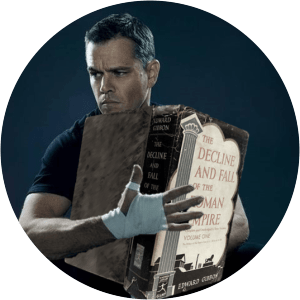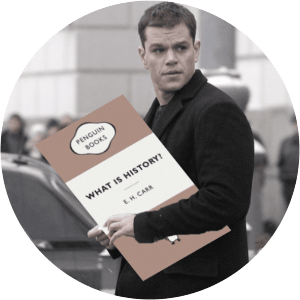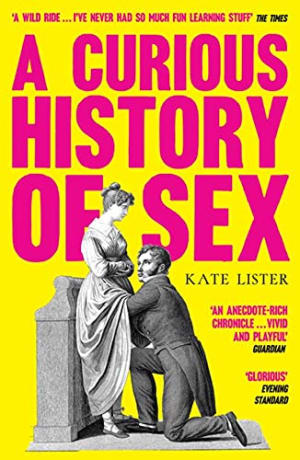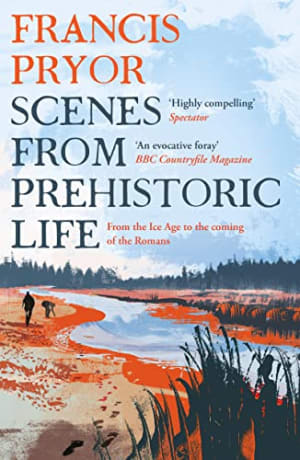...he’s a functioning microcosm of us all. I mean, we’re all trying to find out who the hell we are, aren’t we?
Jason Bourne, in Robert Ludlum’s “Bourne Identity”

Grievously wounded: close to death and clinging to wreckage in the Mediterranean sea. Rescued by French fishermen and deposited in the bedroom of the local alcoholic to recuperate. When he wakes he can remember nothing. The only clue he has is a bank account with $4m dollars in it and a name: Jason Bourne.
As members of the human race, we all start out like Jason Bourne in the Robert Ludlum series of thrillers – although my starter fund was £10 in premium bonds rather than $4m in a Swiss bank account. But really all we have is a name. The past before we were born is blank and unknown. Gradually we piece together what the dickens happened and how on earth we got to this point.
Jason Bourne did it by running around Europe with a gun and a ridiculous array of special abilities.
We do it by reading history books.
Contents
Links are to the headings in the article below
- Immediate benefits – as soon as you start reading
- Benefits of knowing a bit more – after reading a history book or two
- Benefits to how we think – after reading a number of history books
- Problems with reading history books
- Conclusion
This post is my personal reflection on the benefits I get from reading history books. One of my aims in writing it is to clarify my thinking, but also I want to do my bit to encourage others to do more of this enjoyable, rewarding activity!
It also serves as a thank you to those who write history books! Scroll down to the post script if this is you.
Immediate benefits – as soon as you start reading
Find out what happened – satisfy your curiosity
Exploration is a primeval human urge. Given time travel is not an option if we want to explore the past one of the best ways of doing so is to read a history book. Finding out more about a time or place that you feel a connection to but have very little knowledge of, can be an exciting, even thrilling experience.
Entertain yourself with a history book
One way of looking at history is as the collection of the highest rated / most shared stories over the last few hundreds or thousands of years. Admittedly I am overlooking severe problems of bias, attrition and suffering but there is a kernel of truth here: do you want to read a story about the time when nothing really happened and nobody said or did anything very interesting? Well you are unlikely to find it in a history book – popular history books are often also written explicitly to entertain us as well as inform us.
Benefits of knowing a bit more – after reading a history book or two
Reading history can help us figure out what people are saying
We scatter historical references through-out our everyday speech whether we are aware of it or not. When we talk about left or right-wing politics we are harking back to the French Revolution. When we bemoan a Spartan meal we have the ancient Greeks to blame. When we meet our Waterloo we are self-identifying with a bloody warmonger of average height. To be honest most of the time we can get on perfectly well without knowing exactly what someone means by their classical allusions – it did me no harm to spend many years with the vague impression that Hannibal was an elephant – but it is nice to know what is making everyone else nod sagely in agreement.
History books can help us understand the present better…
It is only by having an idea of the past that we can appreciate why people hold the values they do today and why they behave as they do. For example the Arab-Israeli conflicts are rooted in historical experience and only make sense from that perspective. We can also understand the buildings and landscapes around us better if we know what shaped them. Does it matter? If you want to create connections with different people and places then it matters a lot.
...even history from a very long time ago
The stories people choose to remember and repeat from their past can be very revealing of their preoccupations in the present. For example every Chinese schoolchild has a good understand of the Opium wars in the 19th Century, when the Chinese people were “humiliated” by their inability to resist aggressive drug-pushing Western powers. This event is long gone from living memory but reflects the current generation’s desire for China to be seen as a strong independent country.
Understand where we come from, and reinforce our identity
Reading history books can give help people develop a sense of their place in the world. Often this is national history, bringing people together through shared experience, even if we are only reading about that experience. This can also be a very conscious project particularly for “younger” countries – and must countries in the world are less than 100 years old. But identity is much more complex than simply which country you live in, and reading about history which is relevant to your life can reinforce and help you feel confident in who you are.
Benefits to how we think – after reading a number of history books
Understand the range of human experience
If we can appreciate ourselves better through history books we can also appreciate how other people have lived their lives. I think this is crucial because our achievements are limited by our imagination – we can only create what we can envisage. Reading about the Harrapan or Indus Valley Civilization gives us an example of a sophisticated urbanised bronze age culture that was seemingly very egalitarian and peaceful. This can inspire us to think about better ways of organising our own society – or at least who to vote for to do it for us! On the other hand reading about some of the terrible things that have happened in the past can help us to know when to stand up for what we believe in.
Appreciate how things change
History is sometimes defined as the study of the processes of change. I think that reading history – changes in the past – can help you better understand changes that are happening now or what might contribute to change in the future. Stretching the argument a little: you might use this historical sense to try to improve your own life… Turning to a famous example from history: when Julius Caesar was in his early 30s he is burst into tears on realising that while Alexander the Great had conquered the known world by 32, he himself had achieved nothing. So he dried his eyes, picked himself up by his sandal straps, and went on to slaughter millions of Gauls and destroy the Roman Republic – and no doubt felt much better about himself.
Develop your reliabili-meter or truth-sense
History can be fiercely contested. Even in the best cases it will be influenced by the circumstances of the author, sometimes it can be deliberately highly biased. By reading a range of history books we can become more critical readers, not just accepting what we are told. This is most obvious when we read two different versions of the same thing. History books naturally encourage us to ask questions like: what evidence is there to support the argument? Or: how might the perspective of the author influence his story?
With our reliabili-meter honed from reading history books we are then better prepared to face the even more hotly contested battleground of the present… where bias and attempts at manipulation are even more ubiquitous! And when a politician promises to bring back the good old days, we will have a feel for just how good the old days really were… and the success rate for previous politicians promising to turn back the clock.
You can learn lessons from history books
The idea of learning lessons from history books is actually quite controversial in the British historical tradition. I have heard a number of historians scoff at the idea that you should read history to learn lessons. However I think what they really mean is: don’t oversimplify history to a set of straight-forward “lessons learned”. But clearly you would expect to learn something from reading history books even if not quite as directly as many would have us believe – most of us will not be in a position to decide whether or not to march on Moscow in winter for example. So while I think there are lessons to be learned, exactly what this means is quite complex and deserves it’s own blog post (watch this space).
Problems with reading history books
In this blog we aim for fairness and balance so I will now turn to the drawbacks of reading history books. The clearest disadvantage for me is the risk of focussing exclusively on the past and thereby glossing over the present. To illustrate this: I can remember visiting Morocco a while back and being struck by the fact that my guidebook was full of information about historic buildings and old empires but had very little to say about Morocco today. How did people make a living? What did they do in their free time? What did they learn at school? Nothing. The effect was, along with most other tourists, that we mostly ignored the thriving nowadays Morocco and instead inspected the fallen-down ruins of the past.
There are a few other potential problems I can think of, for example historical myopia and “bubble history” but I will leave it there for now…

Conclusion
Having no history, as Jason Bourne found out, is a very uncomfortable place to be – and discovering who we are, what’s going on, and when to trust other people (or not) are fundamental benefits of investigating and pondering our past.
To find out his history, where he came from and how he fit in, Jason B used his finely honed martial arts skills, his mastery of disguise and his formula 1 level driving abilities.
All we need is the ability to read and the curiosity to get started.
Postscript
It is a truth universally acknowledged that it wouldn’t be possible to read history books if no one was writing history books. I would like to acknowledge the incredibly hard and valuable work of historians, sometimes spending 5 to 10 years of their lives to produce a single book (that we then devour in a matter of weeks). History is one of the relatively few academic disciplines where the professionals haven’t disappeared over the horizon into inaccessible journals and continue to write serious books for ordinary people, providing a wide range of high quality and well researched new history books to choose from every year (see 2021 history books as an example). I’m sure also that the financial rewards for writing a history book are typically not very big even when it sells reasonably well. So if you are reading this as a historian and author: thank you.


